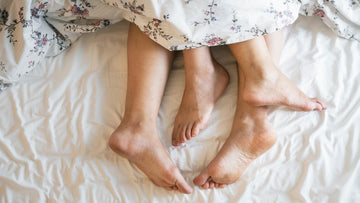How your cycle influences your sex drive

If you’re anything like me, you’ve heard random pieces of information saying that your sex drive correlates with your menstrual cycle. I’ve always been interested to learn exactly how this happens and what goes on every 28 days in my cycle, so I decided to investigate.
Let’s begin with a simple overview of the cycle. There are four main phases: menstruation (when you’re bleeding), the follicular phase (after your body is done bleeding), ovulation (when your body is most fertile), and the luteal phase (before your period comes again). Hormone levels fluctuate throughout the whole cycle, typically lasting 28 days. Also, here’s a comprehensive snapshot of the menstrual cycle.
Before we get into the cycle’s impact on sex drive, let’s quickly review what hormones affect our desire to get it on. A boost in estrogen leads to increased libido, while boosted progesterone leads to a lower sex drive, according to Flo (one of our fav period tracking apps).

Recommended for you!
As I mentioned above, hormones (like estrogen and progesterone) fluctuate at different points in the cycle. Let’s take a look, shall we?
While you’re on your period and the blood is flowing, both estrogen and progesterone levels are lower. This means you may be less into getting it on in the bedroom.
Now, if you’re a menstruating human, you’ve likely heard of ovulation. If you’re TTC (trying to conceive), it’s safe to assume you know all about what ovulation does to your bod. However, I’m going to lay it out for you:
Ovulation happens about two weeks before your period starts. During ovulation, you’re fertile and your body is all geared up to make a baby. This means that your estrogen levels are going up and you're getting pretty horny (or “randy” if you’re British - great word, IMO).
Curious how to tell if you’re ovulating? We recommend a few different things: period tracking apps (like Flo or Tia), tracking discharge (egg white and stretchy means you’re ovulating), or taking ovulation tests (you can buy ‘em over-the-counter). If you’re not trying to make a baby, it’s incredibly important to use protection during ovulation (but let’s be real, use protection all the time!)
Once ovulation is said and done, your progesterone is on the up. This means you’re likely going to experience a drop in your libido.
So, next time you want to get it on, think about where in your menstrual cycle you may be! It might help explain why you feel the way you do and how your cycle influences your sex drive as a result. Of course, when you’re in the menstruation phase and bleeding, you can still enjoy sex. We’re all about period sex, and your estrogen levels surely don’t have to be on the rise for you to enjoy yourself.
Whether or not you're trying to conceive, it can be tricky to determine when to take a pregnancy test. We built this easy flow chart to help with just that.
Meet the Winx Health (formerly known as Stix) tests: Private and delivered
ovulation-tests
pregnancy-tests
Keep Reading

Morning-after pill side effects: what to expect
Aug 14

Do I need a prescription to treat a UTI?
Aug 13

What is queefing?
Aug 7









